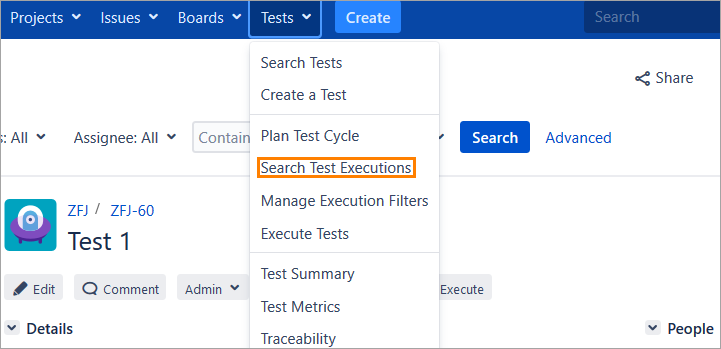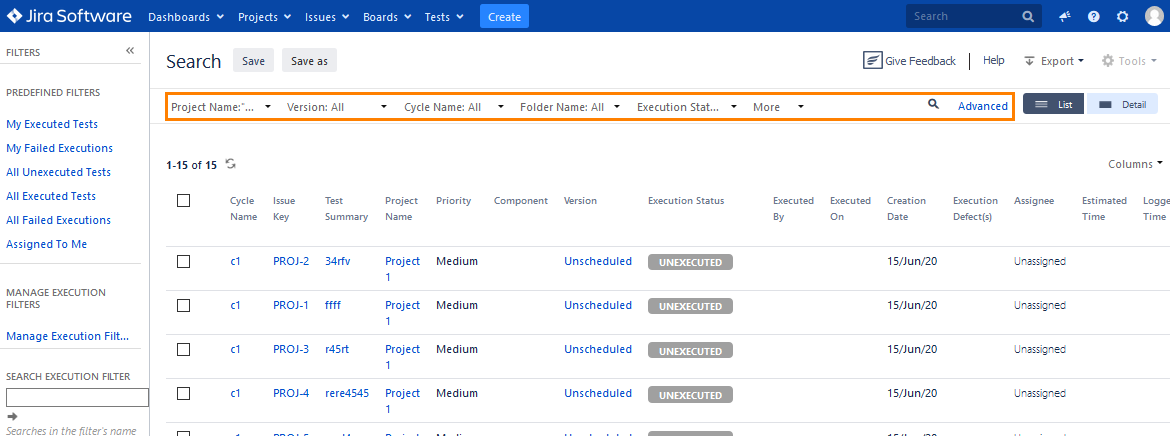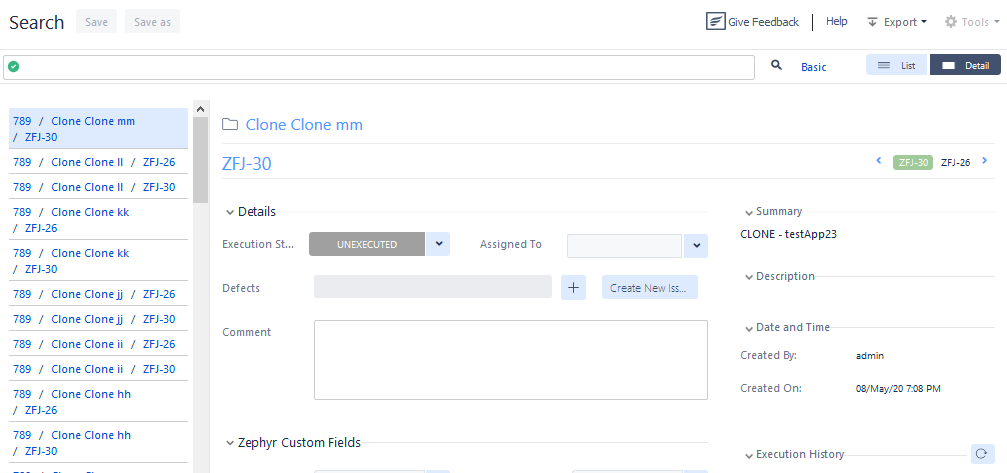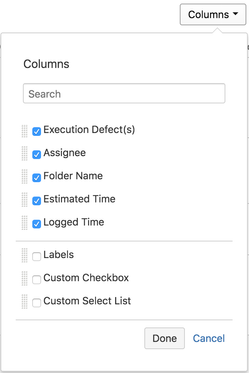Search Test Executions
Zephyr for Jira is now Zephyr Squad! Read more about this. |
You can search for certain test executions to quickly change their status, move them to a cycle, delete them, or perform other operations (see below). To search for test executions:
1. Navigate to Tests > Search Test Executions:
2. In the Execution Navigator, switch to the Basic or Advanced mode and search for your test executions by selecting filters from the dropdowns (Basic mode) or by using a ZQL query (Advanced mode):
ZQL (Zephyr Query Language) is a simple structured query language that allows you to string together the right fields to search on with values, using the appropriate operators and keywords. The search box allows auto-completion making it really easy to construct a query. With the cursor in the search box, press the spacebar on your keyboard to view a list of fields, operators, keywords and values.
For example, if you are looking for all the failed tests in the Ironclad project, you need to enter a query that looks like this:
project = Ironclad AND executedStatus = FAIL
Here, project and executedStatus are fields, and ironclad and fail are the values, joined together by the keyword AND
You can also search for test executions via custom fields. This is done by using ZQL as well.
- The keyword when searching for a defined custom field is ZCF
- For example:
- If you have a custom check box with the header “Custom Status” and one of the options is “Finished?” and you want to search for test executions that are “Finished?”, use the following:
Custom Status = “Finished?”
See the ZQL Reference page for a list of all possible fields, operators and keywords.
To learn how to search for tests, see Search Tests.
List and Detail Views
The results of a ZQL search are shown in a List View (see above) but can also be seen in a detailed view.
Selecting the Detail View displays the search results in two sections - the left section shows the list of executions and on selecting it, the right section shows the details of that test execution. A test can be executed from this detailed view:
Customizing Columns
The List view of a resulting search has a number of columns of data. Columns can be selected or deselected and can be reordered by clicking on the "Columns" button in the upper right. Drag the gripper at the left of a column name to move it up and down. When done, the columns will be reordered.
Users can display the custom fields defined for the test executions by simply selecting the custom field within the column section. The custom fields for a test execution are normally at the bottom.
Saving Searches
The results of a search can be saved as a filter (just like you would in Jira's Issue Navigator). These filters show up on the left in a list of Favorite Filters. Clicking on them runs the query again.
Manage Execution Filters
Once searches have been saved to a filter, these filters can be managed (modified, shared, deleted etc.) from the Manage Execution Filters page.
Predefined Filters
Zephyr for Jira comes with a few predefined filters that allow you to quickly access certain often accessed data.
Working with Search Results
Once you have completed a search, the search results section displays a list of test executions. A test can be quick-executed right from this list.
A number of tasks can be performed on these test executions. Selecting one or more tests (or all in the view shown), the following actions are possible:
Status: The execution status can be changed
Delete: Test executions can be deleted
Move to Cycle: The selected test(s) can be moved to another test cycle
Copy to Cycle: The selected test(s) can be cloned into another test cycle
Associate Defect(s): One or more existing defects can be associated to the selected test(s)
Assign Executions: The selected test(s) can be bulk assigned to users in the system.
Custom Field(s): The custom field(s) can be bulk edited and changed to different values when selecting on a project or global custom field level.
Export: Test executions can now be exported in a variety of formats: XML, RSS, HTML, CSV and Excel.





Starting Release 8.2, Zephyr Enterprise documentation is moving from its current location on Atlassian to a dedicated, standalone Zephyr Enterprise Documentation page. https://support.smartbear.com/zephyr-enterprise/docs/en/welcome-to-zephyr-enterprise.html